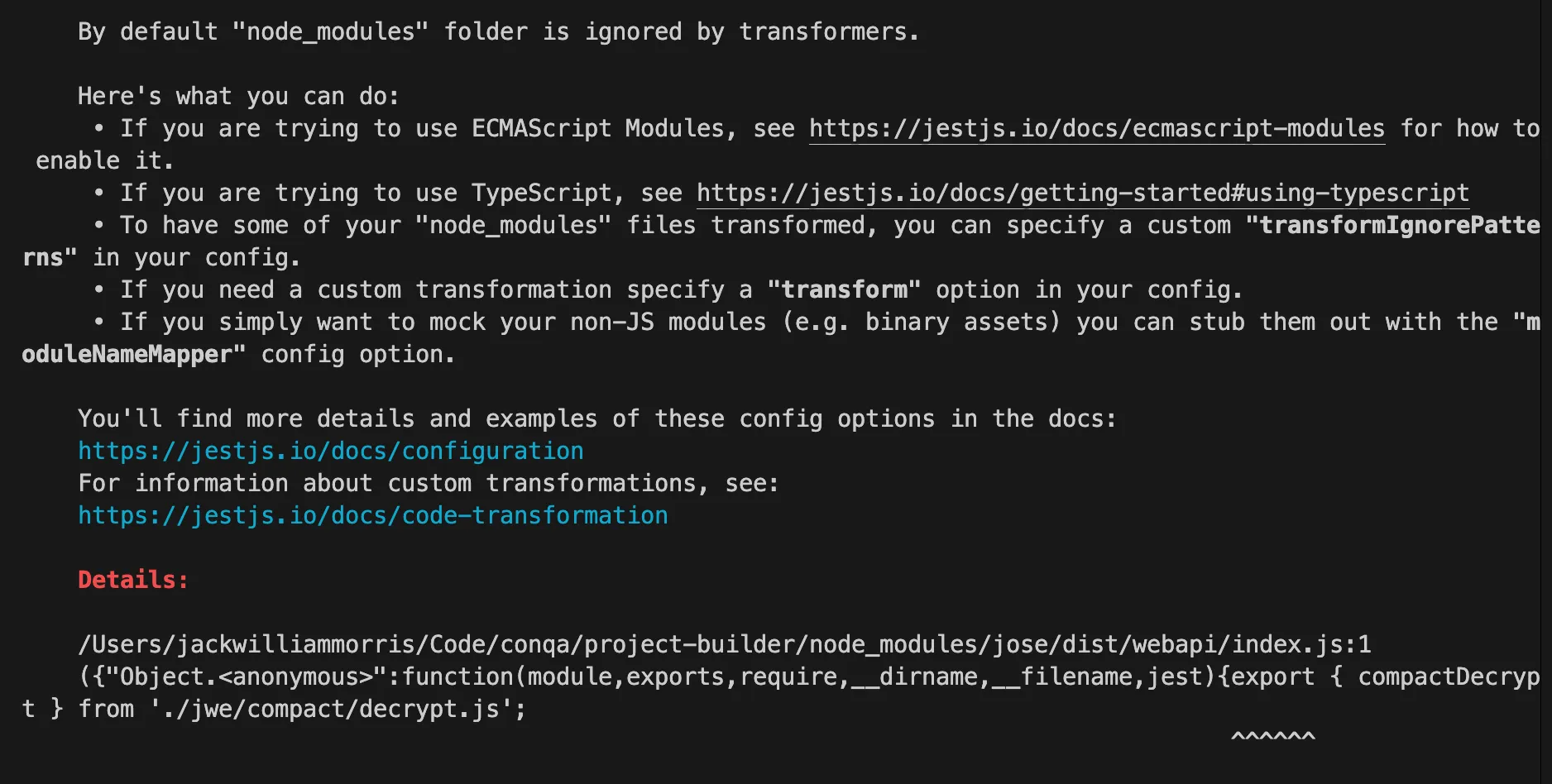Jest: Handling ES Module Dependencies
How to configure Jest to work with ESM-only libraries like jose, including the necessary transformer and TypeScript settings.
The Problem
While writing tests for a project, I hit a snag when importing a function from the jose library—a modern, ESM-only crypto toolkit.
import { compactDecrypt } from "jose";When running the test, Jest threw an error.

Understanding The Root Cause
The cause of this error is pretty simple. Jest does not have native support for interpreting ES modules, which jose is distributed as.
Why Jest Needs Transformers
Jest needs transformers like babel or ts-jest to run JSX, TypeScript, and newer JavaScript syntax (features). Setting them up properly often requires extra plugins or presets. Jest relies on these transformers to preprocess files before execution:
This transformation can also be required for taking newer ES6 syntax and compiling it down to a format that Jest and the Node JS runtime it operates in to an interpretable format
- JSX: JSX syntax (used in React) isn’t valid JavaScript and needs to be transformed into standard JavaScript function calls before execution.
- TypeScript: Must be transpiled to JavaScript.
- Modern JavaScript (ES6+): > New syntax supports features like async/await and optional chaining, but not all runtimes understand it. So it’s important to use a transformer that compiles it down into a format that Jest and the Node runtime it operates in can interpret.
- ES Modules: Different module resolution strategies. The way modules are resolved brings in modern syntax (like import/export) that the runtime might not understand directly — which is why a transformer is needed.
- Non-JS Assets: Static assets like images, icons.
By default, transformers ignore files in node_modules because most libraries provide a CommonJS build. But some, like jose, do not make this affordance—which causes the error above.
The Fix
Step 1: Configure Transformers To Handle ESM Library
To fix this, we tell the transformers to process jose much the same as they do our own application code.
The first change we needed to make was in our jest.config.js, where we told ts-jest, Jest’s transpile or transform tool, to not ignore the jose dependency and to process it.
module.exports = { preset: 'ts-jest', ..., transformIgnorePatterns: ['/node_modules/(?!(jose)/)'], ...,};Step 2: Use The Right Preset For JavaScript
By default, ts-jest doesn’t process JavaScript files. But all our node_modules are bundled as JavaScript—just in varying formats like CommonJS or ESM, and with different syntax. So, we needed a preset that supports compiling JavaScript files.
module.exports = { preset: 'ts-jest/presets/js-with-ts', ..., transformIgnorePatterns: ['/node_modules/(?!(jose)/)'], ...,};Step 3: Configure TypeScript To Process JavaScript Files
Finally, to make this work, we needed to configure the TypeScript compiler (used by ts-jest) to also process JavaScript files.
{ "compilerOptions": { ..., "allowJs": true }, ...,}Summary
So, in summary, for Jest to be able to handle ESM libraries we needed to:
- Explicitly told Jest which ESM libraries need transformation.
- Used the right preset that can handle both TypeScript and JavaScript files.
- Configured TypeScript to process JavaScript files from node_modules.